Yuxin Cai
Joint Learning of Unsupervised Multi-view Feature and Instance Co-selection with Cross-view Imputation
Dec 17, 2025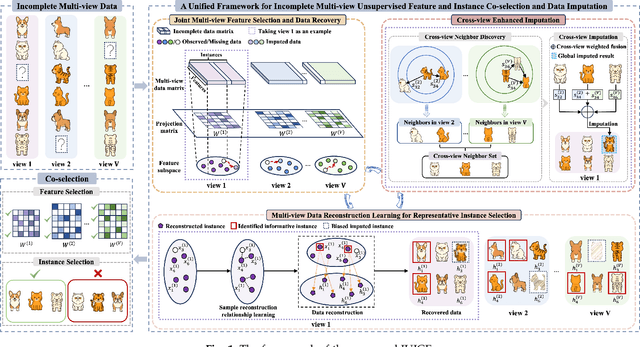
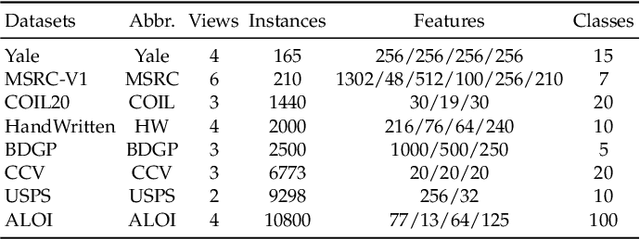

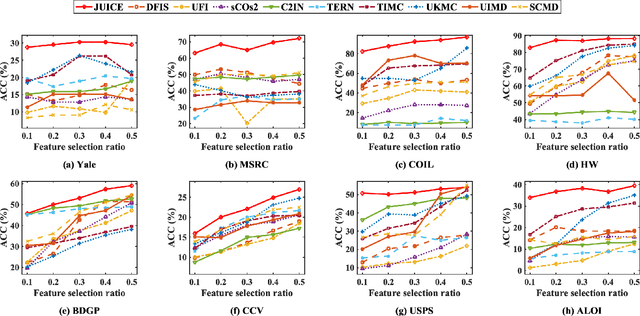
Abstract:Feature and instance co-selection, which aims to reduce both feature dimensionality and sample size by identifying the most informative features and instances, has attracted considerable attention in recent years. However, when dealing with unlabeled incomplete multi-view data, where some samples are missing in certain views, existing methods typically first impute the missing data and then concatenate all views into a single dataset for subsequent co-selection. Such a strategy treats co-selection and missing data imputation as two independent processes, overlooking potential interactions between them. The inter-sample relationships gleaned from co-selection can aid imputation, which in turn enhances co-selection performance. Additionally, simply merging multi-view data fails to capture the complementary information among views, ultimately limiting co-selection effectiveness. To address these issues, we propose a novel co-selection method, termed Joint learning of Unsupervised multI-view feature and instance Co-selection with cross-viEw imputation (JUICE). JUICE first reconstructs incomplete multi-view data using available observations, bringing missing data recovery and feature and instance co-selection together in a unified framework. Then, JUICE leverages cross-view neighborhood information to learn inter-sample relationships and further refine the imputation of missing values during reconstruction. This enables the selection of more representative features and instances. Extensive experiments demonstrate that JUICE outperforms state-of-the-art methods.
COVLM-RL: Critical Object-Oriented Reasoning for Autonomous Driving Using VLM-Guided Reinforcement Learning
Dec 10, 2025Abstract:End-to-end autonomous driving frameworks face persistent challenges in generalization, training efficiency, and interpretability. While recent methods leverage Vision-Language Models (VLMs) through supervised learning on large-scale datasets to improve reasoning, they often lack robustness in novel scenarios. Conversely, reinforcement learning (RL)-based approaches enhance adaptability but remain data-inefficient and lack transparent decision-making. % contribution To address these limitations, we propose COVLM-RL, a novel end-to-end driving framework that integrates Critical Object-oriented (CO) reasoning with VLM-guided RL. Specifically, we design a Chain-of-Thought (CoT) prompting strategy that enables the VLM to reason over critical traffic elements and generate high-level semantic decisions, effectively transforming multi-view visual inputs into structured semantic decision priors. These priors reduce the input dimensionality and inject task-relevant knowledge into the RL loop, accelerating training and improving policy interpretability. However, bridging high-level semantic guidance with continuous low-level control remains non-trivial. To this end, we introduce a consistency loss that encourages alignment between the VLM's semantic plans and the RL agent's control outputs, enhancing interpretability and training stability. Experiments conducted in the CARLA simulator demonstrate that COVLM-RL significantly improves the success rate by 30\% in trained driving environments and by 50\% in previously unseen environments, highlighting its strong generalization capability.
VLMLight: Traffic Signal Control via Vision-Language Meta-Control and Dual-Branch Reasoning
May 26, 2025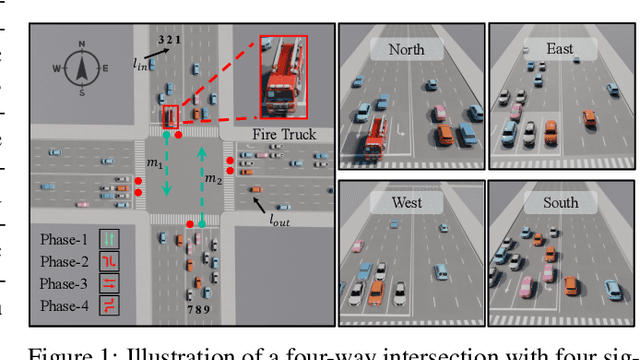
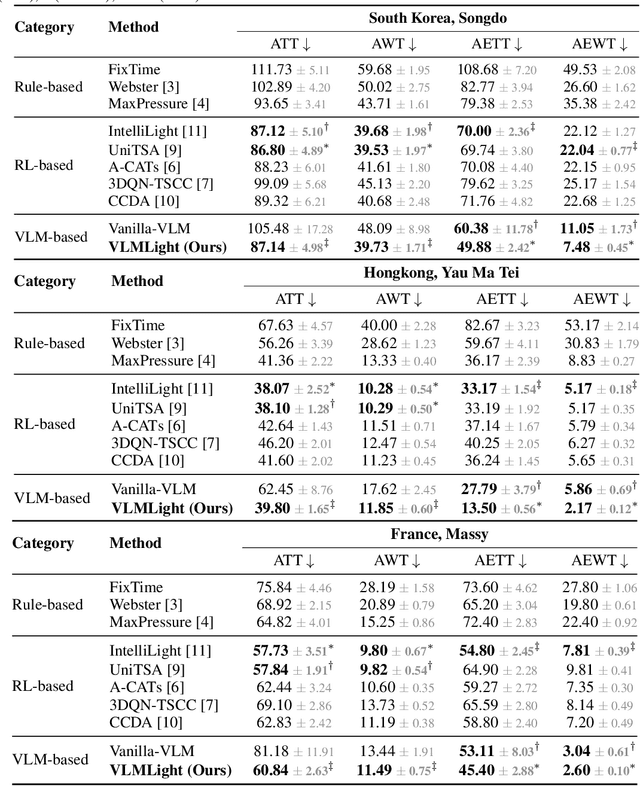
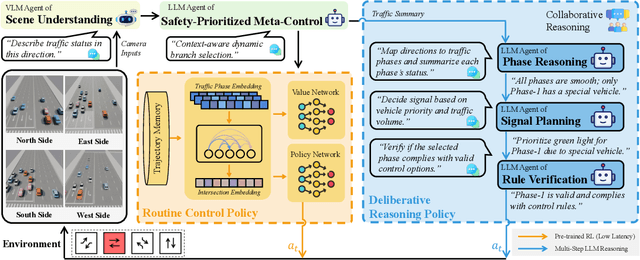

Abstract:Traffic signal control (TSC) is a core challenge in urban mobility, where real-time decisions must balance efficiency and safety. Existing methods - ranging from rule-based heuristics to reinforcement learning (RL) - often struggle to generalize to complex, dynamic, and safety-critical scenarios. We introduce VLMLight, a novel TSC framework that integrates vision-language meta-control with dual-branch reasoning. At the core of VLMLight is the first image-based traffic simulator that enables multi-view visual perception at intersections, allowing policies to reason over rich cues such as vehicle type, motion, and spatial density. A large language model (LLM) serves as a safety-prioritized meta-controller, selecting between a fast RL policy for routine traffic and a structured reasoning branch for critical cases. In the latter, multiple LLM agents collaborate to assess traffic phases, prioritize emergency vehicles, and verify rule compliance. Experiments show that VLMLight reduces waiting times for emergency vehicles by up to 65% over RL-only systems, while preserving real-time performance in standard conditions with less than 1% degradation. VLMLight offers a scalable, interpretable, and safety-aware solution for next-generation traffic signal control.
CL-CoTNav: Closed-Loop Hierarchical Chain-of-Thought for Zero-Shot Object-Goal Navigation with Vision-Language Models
Apr 11, 2025Abstract:Visual Object Goal Navigation (ObjectNav) requires a robot to locate a target object in an unseen environment using egocentric observations. However, decision-making policies often struggle to transfer to unseen environments and novel target objects, which is the core generalization problem. Traditional end-to-end learning methods exacerbate this issue, as they rely on memorizing spatial patterns rather than employing structured reasoning, limiting their ability to generalize effectively. In this letter, we introduce Closed-Loop Hierarchical Chain-of-Thought Navigation (CL-CoTNav), a vision-language model (VLM)-driven ObjectNav framework that integrates structured reasoning and closed-loop feedback into navigation decision-making. To enhance generalization, we fine-tune a VLM using multi-turn question-answering (QA) data derived from human demonstration trajectories. This structured dataset enables hierarchical Chain-of-Thought (H-CoT) prompting, systematically extracting compositional knowledge to refine perception and decision-making, inspired by the human cognitive process of locating a target object through iterative reasoning steps. Additionally, we propose a Closed-Loop H-CoT mechanism that incorporates detection and reasoning confidence scores into training. This adaptive weighting strategy guides the model to prioritize high-confidence data pairs, mitigating the impact of noisy inputs and enhancing robustness against hallucinated or incorrect reasoning. Extensive experiments in the AI Habitat environment demonstrate CL-CoTNav's superior generalization to unseen scenes and novel object categories. Our method consistently outperforms state-of-the-art approaches in navigation success rate (SR) and success weighted by path length (SPL) by 22.4\%. We release our datasets, models, and supplementary videos on our project page.
CONDEN-FI: Consistency and Diversity Learning-based Multi-View Unsupervised Feature and In-stance Co-Selection
Dec 09, 2024



Abstract:The objective of multi-view unsupervised feature and instance co-selection is to simultaneously iden-tify the most representative features and samples from multi-view unlabeled data, which aids in mit-igating the curse of dimensionality and reducing instance size to improve the performance of down-stream tasks. However, existing methods treat feature selection and instance selection as two separate processes, failing to leverage the potential interactions between the feature and instance spaces. Addi-tionally, previous co-selection methods for multi-view data require concatenating different views, which overlooks the consistent information among them. In this paper, we propose a CONsistency and DivErsity learNing-based multi-view unsupervised Feature and Instance co-selection (CONDEN-FI) to address the above-mentioned issues. Specifically, CONDEN-FI reconstructs mul-ti-view data from both the sample and feature spaces to learn representations that are consistent across views and specific to each view, enabling the simultaneous selection of the most important features and instances. Moreover, CONDEN-FI adaptively learns a view-consensus similarity graph to help select both dissimilar and similar samples in the reconstructed data space, leading to a more diverse selection of instances. An efficient algorithm is developed to solve the resultant optimization problem, and the comprehensive experimental results on real-world datasets demonstrate that CONDEN-FI is effective compared to state-of-the-art methods.
C$^{2}$IMUFS: Complementary and Consensus Learning-based Incomplete Multi-view Unsupervised Feature Selection
Aug 20, 2022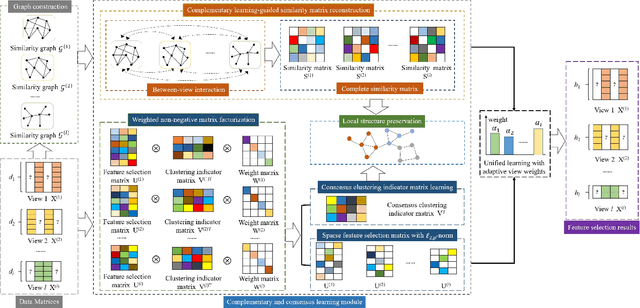
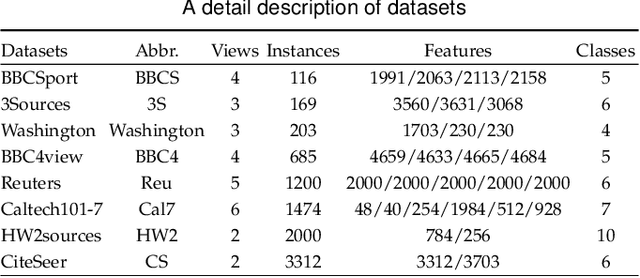
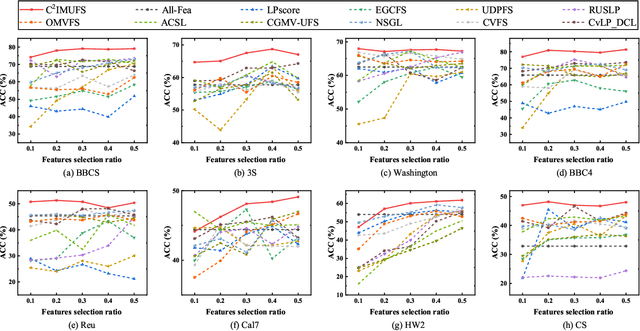
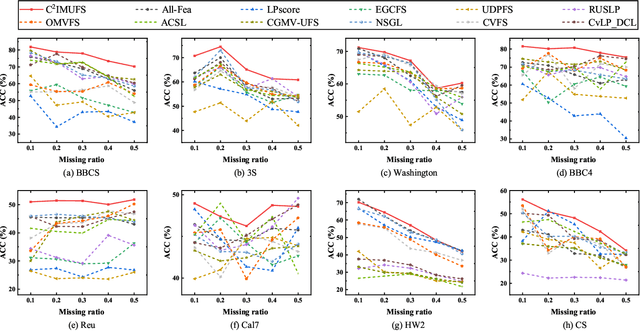
Abstract:Multi-view unsupervised feature selection (MUFS) has been demonstrated as an effective technique to reduce the dimensionality of multi-view unlabeled data. The existing methods assume that all of views are complete. However, multi-view data are usually incomplete, i.e., a part of instances are presented on some views but not all views. Besides, learning the complete similarity graph, as an important promising technology in existing MUFS methods, cannot achieve due to the missing views. In this paper, we propose a complementary and consensus learning-based incomplete multi-view unsupervised feature selection method (C$^{2}$IMUFS) to address the aforementioned issues. Concretely, C$^{2}$IMUFS integrates feature selection into an extended weighted non-negative matrix factorization model equipped with adaptive learning of view-weights and a sparse $\ell_{2,p}$-norm, which can offer better adaptability and flexibility. By the sparse linear combinations of multiple similarity matrices derived from different views, a complementary learning-guided similarity matrix reconstruction model is presented to obtain the complete similarity graph in each view. Furthermore, C$^{2}$IMUFS learns a consensus clustering indicator matrix across different views and embeds it into a spectral graph term to preserve the local geometric structure. Comprehensive experimental results on real-world datasets demonstrate the effectiveness of C$^{2}$IMUFS compared with state-of-the-art methods.
 Add to Chrome
Add to Chrome Add to Firefox
Add to Firefox Add to Edge
Add to Edge